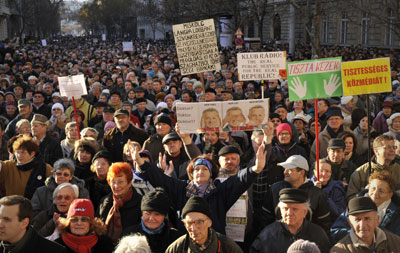“Klubrádió solely wants to provide news and present different opinions and never meant to play any emblematic role. But, because of the decision of the Media Authority, it has became the symbol of free speech in Hungary,” stated the broadcaster’s CEO, András Arató, on Sunday when addressing thousands of demonstrators who gathered in central Budapest to express their support for the station. Once this popular talk radio broadcaster loses its frequency license (which was reallocated to a previously unknown media group that tendered a higher price) in a matter of weeks, pro-government dominance will be nearly complete in terms of broadcast news programs in the country.
Since the conservative Hungarian Civic Union, or Fidesz, came to power with a super-majority in parliament in 2010, media freedom in the country has gradually deteriorated. As a delegation of 12 international free speech and media development NGOs concluded in Budapest in November, the confluence of a restrictive regulatory environment, deteriorating economic conditions, technological change, and a lack of solidarity among professionals created a perfect storm and put independent media in danger. The participants of the mission, which was organized by the South East European Network for Professionalization of Media, also emphasized that the broad, uncertain, and inconsistent provisions of the new Hungarian laws created a chilling effect and strengthened self-censorship among journalists. (The key findings of the mission can be found here, and excerpts from the delegation’s press conference can be watched here.)
State media outlets are under firm control in Hungary. The state Hungarian News Agency, MTI, provides most of its services to media organizations free of charge. This suppresses competition in the news market, resulting in a kind of copy-and-paste journalism, especially at smaller media outlets with limited resources. The state radio and television stations predominantly echo official viewpoints. The most striking case occurred when the image of the former chief justice was blurred in a December TV news show because previously he had expressed criticism toward the government. This incident led to a hunger strike by a group of trade union activists and producers, and a movement for honest public service broadcasting was launched. Their demands practically have been ignored by the omnipotent Media Authority.
Though Hungary has two popular commercial television stations, which are independent of direct political influence, their news shows are rather sensationalist and seldom provide the context of political and social events. Print media outlets have never fully recovered after the 2008 financial crisis, and political papers either stagnate or keep losing readers. Mostly due to the growing importance of online portals, media pluralism still exists in the country, but the space for public discussion has significantly narrowed and it is becoming increasingly difficult for citizens to receive unbiased, in-depth information about issues of public interest.
At the same time, two recent positive developments need to be mentioned. Upon the initiative of the Center for Independent Journalism, the Editors’ Forum was launched in Budapest last week. This new association brings together over 30 media organizations and promotes the practice of ethical journalism. The participating organizations have committed to a set of ethnical guidelines and pledged to defend media freedom.
Furthermore, the late December ruling of the Constitutional Court about the media law had some favorable outcome. The Court annulled the provision limiting protection of journalistic sources and took written media content out of the scope of the regulation with effect from May 31, 2012. The decision, however, failed to address other key issues, including the vague definitions of content restrictions and the political influence over the regulatory Media Council and public service media outlets. Thus, as the human rights and free expression representatives of the Organization for Security and Co-operation in Europe, the Council of Europe and the United Nations have already stated, a wholesale review of Hungarian media regulation is still necessary.
Alongside the media legislation, dozens of other controversial laws and a new constitution were pushed through the parliament — without the proper public debate — by the populist Prime Minister Viktor Orbán and his party. This raised serious concerns both in the U.S. government and the European Commission. In late December, U.S. Secretary of State Hillary Clinton expressed her criticisms in a letter addressed to Orbán about the elimination of checks and balances in Hungary.
Then, last Tuesday, the European Commission launched legal proceedings against Hungary, a European Union member state since 2004, because of the recently adopted laws on the central bank, the judiciary, and the data protection and access to information authority. Wednesday, the Hungarian media situation will be discussed in Brussels at the meeting of the Commission’s High-Level Group examining what media pluralism and freedom mean in practice.
It will be increasingly difficult for the Hungarian government to ignore critical voices coming from the international community, especially because the country’s economy has been mismanaged, the state debt is now downgraded to junk by ratings agencies, and in order to stabilize the situation the country needs to reach a deal with the EU and the International Monetary Fund on a new standby loan worth up to 20 billion euros.
In the recently published report on ‘Freedom in the World 2012,’ Freedom House emphasizes that Hungary poses the most serious problem in Central Europe because press freedom and political pluralism are under threat. In this situation, human rights and free speech advocates need to watch even more closely what is going on in the country and make sure that their findings reach both the civil society actors and the decision makers in Budapest, Brussels and Washington.
